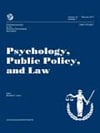In determining custody arrangements, parental conflict has been overrated, and parent-child relationships are more closely linked to child outcome. This is the bottom line of a recently published article in Psychology, Public Policy, and Law. Below is a summary of the research and findings as well as a translation of this research into practice.

Featured Article | Psychology, Public Policy, and Law | 2017, Vol. 23, No. 2, 211-231
Re-examining the Research on Parental Conflict, Coparenting, and Custody Arrangements
Authors
Linda Nielsen, Wake Forest University
Abstract
This article addresses 4 questions: First, how much weight should be given to parental conflict and the quality of the coparenting relationship in determining parenting time—specifically with respect to children’s living at least 35% time with each parent in joint physical custody? Second, to what extent are low conflict and cooperative coparenting connected to better outcomes for children? Third, to what degree are children’s outcomes linked to whether their parents take their custody disputes to court or have high legal conflict? Fourth, is joint physical custody associated with worse outcomes than sole physical custody for children whose parents have a conflicted, uncooperative coparenting relationship? Recent research does not support the idea that conflict—including high legal conflict—should rule out joint physical custody as the arrangement that best serves children’s interests. Parents with joint physical custody do not generally have significantly less conflict or more cooperative relationships than parents with sole physical custody. Conflict and poor coparenting are not linked to worse outcomes for children in joint physical custody than in sole physical custody. The quality of the parent–child relationship is a better predictor than conflict of children’s outcomes, with the exception of the most extreme forms of conflict to which some children are exposed. While continuing our efforts to improve parents’ relationships with one another, we should become more invested in helping both parents maintain and strengthen their relationships with their children.
Keywords
coparenting, divorce conflict, custody conflict
Summary of the Research
“Parental conflict and the quality of the coparenting relationship generally play pivotal roles in child custody evaluations and court decisions, especially with regard to children’s living with each parent at least 35% of the time in joint physical custody (JPC). When separated parents have considerable conflict and get along poorly as coparents, it is often assumed that their children cannot benefit from JPC and may, in fact, have worse outcomes than if they lived in sole physical custody (SPC) with one parent” (p. 211).
“In addressing this issue, this paper focuses on four questions: First, to what extent do low conflict and a cooperative coparenting relationship benefit children? Second, do children whose parents are in high legal conflict or who take their custody disputes to court have worse outcomes than children whose parents reach a custody agreement without high legal conflict? Third, if children live with each parent at least 35% of the time in JPC, are the outcomes significantly better if their parents have little to no conflict and work closely together as a friendly coparenting team? That is, are conflict and poor coparenting more strongly associated with worse outcomes for children in JPC than in SPC families? Fourth, do JPC parents have significantly less conflict and more communicative, cooperative coparenting relationships? If we base our answers to these questions on outdated, flawed, misrepresented, or incomplete data, then we are allowing the conflict and coparenting ‘tail’ to wag the custody ‘dog'” (p. 211).
“To be clear, the question addressed in this paper is not whether chronic, poorly managed conflict that frequently and directly involves the children is linked to worse outcomes for children. The question is how much weight the conflict and cooperation in the parents’ relationship with one another should be given in determining which parenting plans are the most likely to benefit the children” (p. 213).
“Articles were then selected on the basis of whether they had statistically analyzed quantitative data that addressed any of the five questions presented at the outset of this paper. All 44 studies identified through this search were included. In addition, the three published papers where a group of experts have made recommendations regarding JPC and SPC in situations where the parents had conflictual, uncooperative relationships were included” (p. 213).
“The assumption that, unless parents have a low conflict, cooperative relationship, the children will fare more poorly if they have frequent contact with their father or if they live in a JPC family seems to have originated from five studies in the 1980s. […] These beliefs are reflected in custody laws which have historically restricted children’s time with their fathers to every other weekend and occasional vacation time” (p. 213).
“[L]ow conflict and collaborative coparenting at the time of separation and in subsequent years are the bedrock of JPC arrangements. If these assumptions are correct, then whatever positive outcomes for children might be linked to JPC may in fact be linked to the low conflict and cooperation, not to living with each parent at least 35% of the time” (pp. 215-216).
“The alternative and more recent perspective is that conflict and the quality of the coparenting relationship should not be such pivotal issues, especially when the children have—or would be able to develop— supportive, loving relationships with their parents” (p. 216).
“[I]t is a mistake to assume that JPC will be more harmful than SPC for children whose parents were physically abusive toward one another when they lived together” (p. 217).
“The complicated links between conflict and the quality of children’s relationships with their parents is also related to whether the children are caught in the middle of the conflicts. Perhaps all three variables interact: the overall level of conflict, being caught in the middle, and the quality of the parent–child relationship” (pp. 225-226).
Translating Research into Practice
“Overall, high legal conflict or custody hearings have not been found to be reliable measures of how much conflict exists between the parents, how damaging the conflict is to the children, or whether the children could benefit from JPC. This is an important finding because negative assumptions about parents with high legal conflict could lead to custody decisions that restrict children’s time with one of their parents, or that deny them the possible benefits of JPC” (p. 218).
“[S]even of the nine studies fail to support the belief that JPC couples have significantly less conflict than SPC couples at the time they are separating. In two studies, however, the JPC couples did have less conflict than SPC couples. Overall then, conflict is not closely linked to whether the parents have a JPC or a SPC arrangement” (p. 220).
“[A]fter accounting for parental conflict, in 16 of the 17 studies JPC was linked to better outcomes for the children on most measures and was not linked to worse outcomes on any measure. To be clear, these studies did not conclude that high, ongoing conflict had no impact on children or that JPC erased the negative impact of intense conflict involving the children. What these researchers did find is that, even after accounting for conflict, children in the JPC families had better out comes on almost all measures. These findings are extremely important because they refute the claim that JPC cannot be linked to better outcomes for children unless the parents have a low conflict, amicable, collaborative relationship” (p. 222).
“[T]here is not strong support for the belief that high conflict and poor coparenting are closely associated with worse outcomes for children. This is not to say that being dragged into or exposed to ongoing, frequent, high conflict will not be linked to worse outcomes for children when they have close relationships with their parents. But the bulk of the research does not support the belief that the level of conflict is more strongly linked to the outcomes than is the quality of the parent–child relationship. Nor do the data support the generalization that JPC should only be considered appropriate for parents who have low conflict, cooperative relationships or only for parents who resolve their custody disputes without high legal involvement or custody hearings” (p. 224).
“[T]hese studies concur that conflict and coparenting interact with the quality of the parent–child relationships. […] Conflict and coparenting should be considered in the context of the children’s relationships with their parents” (p. 225).
“[T]he best research currently available suggests that the quality of the parent–child relationship is more closely linked than parental conflict or the quality of the coparenting relationship to children’s outcomes, with the exception of the most extreme forms of conflict to which some children are exposed” (p. 228).
“[T]he data strongly support the idea that the quality of the parent–child relationship is the best predictor of future outcomes for the children. In other words, the role of conflict has too often been exaggerated and should not be the determining factor in child custody decisions or in regard to JPC arrangements except in those situations where the children need protection from an abusive or negligent parent” (p. 228).
“While continuing our efforts to reduce parent conflict and to improve the coparenting relationship, we should be equally—or perhaps even more—invested in helping both parents strengthen their relationships with their children and improve their parenting skills” (p. 228).
Other Interesting Tidbits for Researchers and Clinicians
“As previously emphasized, this paper’s discussion of conflict does not apply to the 10%-12% of parents with a history of ongoing violence and severe emotional and physical abuse that has traditionally been referred to as ‘domestic violence’ or ‘battering.’ And as already explained, one of the limitations of the research on ‘violence’ or ‘physical abuse’ in the literature on custody is that the studies do not differentiate between the various types of physical conflict” (p. 217).
“Naturally we cannot draw conclusions from only two studies. But at the very least, we should be aware that no quantitative data yet exist to support the assumption that children whose parents contest custody have significantly worse outcomes than children whose parents agree at the outset on the custody arrangements” (p. 218).
“How common is low conflict and cooperative coparenting for couples with SPC arrangements? The research from the past several decades is robust and consistent: most SPC parents do not have low conflict, cooperative relationships” (p. 218).
“[C]ouples with JPC do not have substantially less conflict than SPC couples at the time they are separating or in subsequent years. […] Still, most JPC couples did not arrive at their custody plan because they were getting along so much better than SPC couples at the time they were separating. Nor are JPC parents a ‘special’ atypical group who have a low conflict, collaborative relationship in the years following their separation” (p. 221).
“[T]he quality of the parents’ relationship with the children mediates the association between conflict and children’s well-being” (p. 224). “Even for young adult children, the quality of their relationship with their parents can mediate the link between being caught in the middle and feeling stressed or dissatisfied” (p. 226).
Join the Discussion
As always, please join the discussion below if you have thoughts or comments to add!







